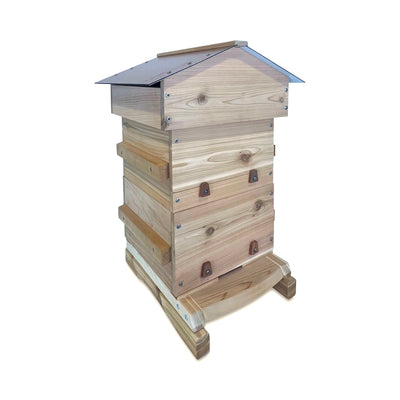Small Business Spotlight: BuzzBox
This spring, we installed hive health monitor, BuzzBox on one of our beehives. BuzzBox was a successful Kickstarter and is now a quickly growing company. The BuzzBox offers in-depth monitoring of colonies. By fastening the BuzzBox to the back of a hive, it perpetually collects valuable, usable data, and real-time updates and feedback. We enjoy listening to and monitoring our hive from our phones! And, it’s easy to share with curious friends who want to hear what hives sounds like, and understand what the colony is experiencing.
BuzzBox features include:
-
Automatic hive health updates via realtime colony audio analysis
-
Check on your colony from your smartphone (Android & iOS)
-
Receive smartphone security alerts to prevent theft or invasion
-
Monitor internal and external temperature, humidity, and barometric pressure
-
Solar powered and fully energy-neutral
-
Weather resistant enclosure for all hardware
-
Transmits data via WiFi (WiFi connection required for v1.0/GSM is in development for v2.0)
-
Over-the-air updates for new, free product features
Below, Read our interview with Aaron Makaruk,
CEO and Co-Founder of BuzzBox !
In using BuzzBox on your own hives, what has been your favorite feature?
I find myself checking in on them first thing in the morning. I love the audio listen-in feature, where you can actually hear them from a period within the last 20 minutes. It's a great way to connect to the bees even if you're not present with them.
BuzzBox began as a Kickstarter and has grown from there. What has surprised you about the data you have seen collected already by your earliest users?
During our data gathering and analysis process, we have discovered that there are audible and measurable differences in the sounds produced by the same bee colony in different health and behavior situations, for example, with a functioning queen vs. queenless. This is something that seasoned beekeepers develop an ear for during decades of experience, and being able to confirm it from an objective perspective and plot the data to differentiate the two different situations is was definitely quite amusing.
How do you hope to expand the features and capability of BuzzBox?
We will be releasing a version that transmits data using the LTE networks, so there won't be range limitations. It will have a different pricing model, due to the need for a data plan, but it will open up the ability for us to deploy the BuzzBox in remote locations where apiaries are. On the software side, we are constantly working to offer richer data insights and to improve the accuracy of our health monitor.
BuzzBox is quite a sophisticated piece of equipment. How long did the design process take and what was a major step forward for the design and engineering?
The design process to this point has taken about 1.5 years. Our team includes multiple software developers and a lead electrical engineer, and we went through multiple iterations to get to this point. We feel that the audio analysis is one of the most important features for beekeepers. You can distinguish a sick colony from an active one, a dormant from one about to swarm, and you can clearly detect when it has collapsed. Microphones are relatively inexpensive, and we're very happy we can provide this level of functionality within a relatively affordable price point.
What feedback have your users shared about their experiences and what they have learned about their own colonies?
People love being able to remotely monitor their hives. Graphing data, understanding hive health through bee audio, and being able to keep digital hive records are things people have consistently given us positive feedback about. Our Instagram page has some nice photos of the BuzzBox in people's hives, and we love seeing the data come in from locations all over the world.
What kind of support has BuzzBox encountered from universities and researchers?
We conducted a 9 month controlled experiment with the USDA Carl Hayden Bee Research Center with Dr. William Meikle. The study tested the impacts of sub-lethal doses of Neonicotinoids on bees, and we gathered a significant amount of sensor and audio data that is helping us enrich our ability to detect sick colonies with the BuzzBox.
We are excited to keep using BuzzBox to monitor our colonies through the seasons.






Leave a comment